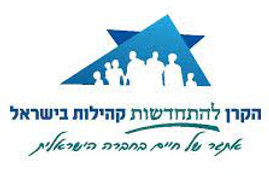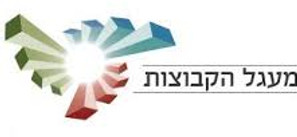
Programs Include:

Daily after-school activities for at-risk teens, which includes volunteering in the community, leadership training and social responsibility.

Democracy, coexistence and friendship programs for Jewish and Arab youth.

Akko Jam Club – a venue for local musicians and national artists open twice a week as a social business.

Collaborative programming across sectors, including the Modern Orthodox, Arab community, and Haredi communities to create mutual understanding and cooperations between the different sectors.
Educator’s Kibbutz, Akko
Dror Israel
The Educator’s Kibbutz in Akko has been at the forefront of the significant positive changes taking place throughout the diverse and historically struggling ancient city. Over a decade ago, 20 ideologically driven educational professionals saw the challenges facing Akko, a multicultural mosaic of Jews, Muslims, Christians, but with fundamental struggles in creating opportunities for upward mobility from many of the city’s disenfranchised residents. Moving together into cooperative housing inside the city, the educators began creating programs to help all of Akko’s youth, regardless of their ethnic or religious background.
Today, the community boasts over 90 members and recently purchased and renovated a new building in the heart of Akko that serves as the hub for social gatherings, educational programming and a leadership training center. By providing strong educational co-curricular activities and engaging Akko’s youth, Dror Israel is successfully bridging social divides, helping the next generation to reach their individual potential and promoting tolerance and co-existence that is already making Akko one of the leading communities in Israel’s North.
Similar Communities in:
Ashkelon, Beer Sheva, Carmiel, Eshbal, Haifa, Jerusalem, Mitzpe Ramon, Petah Tikva, Ravid, Rehovot, Rishon Letzion, Sderot, Tel Aviv, Tiberias.


Programs Include:

Artist in Residence programs host
2-4 Israeli artists from fields of mixed-media artists, dance, films and theater for 4-12 weeks in which they collaborate, use the artist community’s artistic facilities, and create meaningful community outreach work with the local community.

Tarbut School attracts talented, committed young artists and trains them to work and live in cities and neighborhoods across the geo-social periphery. Graduates are accredited by the Israeli Ministry of Culture, and can continue to a full BA in arts and education, including a teaching permit.

Ve’Ahavta art gallery in the old market of Afula, turning this area into a “hip” and colorful place to visit and a venue for local artists and musicians.
Artist Community, Afula
Tarbut
Arts and culture has played a pinnacle role in society throughout history. It helps connect people to each other, provide a medium for expression and understanding, as well as a center for community growth. For millions of Israelis and tourists from around the world, Tel Aviv has emerged an international hub for theater, music, galleries and exhibitions, but arts and culture should not just be limited to Israel’s urban center. The arts have the ability to become a catalyst for community growth all over the country. Over a decade ago, a small group of six artists from the Tel Aviv area shared this view and decided to build a cultural center in the small development town of Afula, in Israel’s Galilee Region. The Galilee is home to some of the most culturally rich and diverse populations in the country, and by promoting artistic expression among the younger generation, these artists have helped to bring more life to Afula and other development towns throughout the country.
Today, the Tarbut Artists community has grown to 50 members, who live and work together, establishing a nucleus for the budding cultural scene outside of the metropolitan center of Israel. Their work has galvanized the community, bringing with it a unique energy and outlet for the youth to express themselves in ways that would have otherwise not been possible. Together with the residents of Afula and the surrounding area, MAKOM’s Tarbut Artists Community has transformed public spaces into cultural happenings, helped beautify areas of the town that have fallen into disrepair and have supported more small businesses owned by local artisans, productions companies and recording studios.
Similar Communities in:


Programs Include:

Kindergarten preparation for school and afternoon tutoring takes place throughout the summer, leaving no child behind. These programs are open to the public.

Early childhood English fun for ages 3-9 involving music, movement stories & games.

Youth leadership program for developing skills and leading volunteer programs in the community.

Young families are encouraged and assisted in pursuing a college education.

A children’s Lizginka dance group is where children practice and perform the special traditional dances.
Mountain Jews Community, Ofakim
MiDor L’Dor
Although it provides a homeland for Jewish people of all backgrounds, many of Israel’s immigrants arriving towards the later part of the 20th century still found themselves on the fringe of Israeli society. For the “Mountain Jews,” who immigrated in the early 1990s from the Caucasus Mountains, the adjustment into Israeli society and retention of their rich traditions became a daily struggle. These Jewish immigrants came from mostly small villages and, being so isolated from the rest of Jewish World, had their own unique set of Jewish traditions and practices.
Many of the Mountain Jews settled in the Southern peripheral region, with limited upward mobility in Israeli society. For the younger generation, the assimilation into Israeli society also meant a loss of their deep cultural roots and rich Jewish tradition. Eight years ago, a group of 35 young volunteers from the Mountain Jews community in Ofakim saw the need to educate the next generation on how to bring the Kafkazi traditions into their lives, as proud Israelis and members of the Mountain Jew community.
Supporting the education of young Kafkazi children, as well as engaging the greater community to understand and experience the traditions that they have brought to the cultural mosaic of Israeli society became a top priority, and today, the Mountain Jews have become a pillar of support for the local community in Ofakim, as well as other major centers throughout the Negev.
By providing quality early childhood education, afterschool programs that allow parents to work or study and youth leadership programming, the Mountain Jew community has invested in building a strong future for their children, while preserving and sharing their heritage with the community at large.
Similar Communities in:
Be’er Sheva, Sderot, Hadera, Pardes Hana-Karkur, Or Akiva, Netanya, Tirat Carmel, Migdal Ha-Emek, Nof Hagalil, Kiryat Yam, Akko


Programs Include:

A unique anthroposophical (integrated and holistic) school for children that draws new families to the region.

A community center on wheels, providing cultural experiences for all ages throughout the area.

Many families from the community promote ecofriendly living styles – a number of homes and gardening initiatives have been built and implemented according to unique environmental standards (including homes built from mud with rooftop water reservoirs).
Ba’aley Teshuvah Community, Shuva
Netiot
There is an intangible connection between Judaism and the Land of Israel, felt by many who call Israel home, whether they reside within the country or around the world. For many who have recently opened their lives to Jewish spirituality and region (Ba’aley Tshuva), their newfound religious identity and the Zionist pioneering spirit go hand in hand, providing a mission driven ideology to settle the Land of Israel. Over a decade ago, ten young families chose to move their lives to Shuva, a small Moshav just 3 miles from the Gaza Border, and establish a spiritually conscious community life that has attracted dozens of more families.
These young families formed a community devoted to service and faith, and caused a rippling demographic effect: the entire region is now being repopulated with young families after 15 years of stagnation. Shuva’s unique and accepting spirit is connecting Judaism with life in every possible aspect, along with the desire to strengthen and encourage this frontier region battered by conflict. Shuva’s national movement, Netiot, invests in projects to help promote social involvement, strengthening the local population and creating a renewed Jewish existence.
Similar Communities in:
Ma’alot-Tarshiha, Haifa, Ramat Hagolan, Tifrach, Ashdod, Mitzpe Ramon


Programs Include:

Youth Villages and Clubs provide over 170 boys and girls with educational activities after school, including empowerment workshops, field trips and extracurricular activities and community volunteering.

The Young Leadership Development Program is a three year course for exceptional youth, focusing on the values of community activism and social invovlement that includes theoretical learning and practical applications of youth led social and educational initiatives within the community.

Pre-Military College Preparatory Programs in collaboration with Shahar Preparatory Schools. This is the only pre-army preparatory program in Israel for the Druze, which prepared young men and women for their national service and professional life.
Druze Community, Beit Jan
Ofakim L’Atid
The Druze community of Beit Jan is deeply rooted in their faith, maintaining strong ties to their religious and cultural practices. They are known for their hospitality and close-knit communal bonds, creating a vibrant and supportive environment within the village.
Ofakim L’Atid in Beit Jan fosters this rich culture, while promoting new social initiatives within the Druze communities, developing young leadership initiatives, supporting higher education for Druze youth, and reducing the social gaps within the greater Israeli community. Established in 2009, Ofakim L’Atid is a catalyst for change within a widely marginalized sector of Israeli society. Its vision is to lead the Druze community to become a successful, progressive, and influential part of Israel’s national identity while preserving its unique heritage.
By engaging with the greater Israeli community, Ofakim L’Atid has helped to create business anchors in social tourism, creating new opportunities for young entrepreneurs and a sustainable impact on bringing the rich Druze heritage to the forefront of the conversation.

Social tourism has been an anchor for economic development in the Druze community, helping train young Druze to share their rich culture for an immersive experience within the Druze community.
Similar Communities in:
Ma'ar, Rama, Horfish, Yanoch, Julis and Shafaram


Programs Include:

A student village for young singles and couples that
connects them to Arad. The goal is that these young
adults will choose to build their home in the city in
the future.

Jewish identity programs throughout schools and
community centers to strengthen awareness,
knowledge and a sense of belonging.

A social tourist initiative that shares the rich history and diverse communities in Arad and the surrounding areas. By showing Arad in this new light this initiative
attracts tourists and supports local businesses, all while providing a unique educational experience.
Modern Orthodox Community, Arad
Bnei Akiva Alumni Movement
For many modern Zionists, the ideals of Judaism and values of the Torah are a key driving force in strengthening many of the weaker communities in Israel's periphery. In the desert community of Arad, overlooking the Dead Sea, the alumni of the Bnei Akiva movement are an integral part of the renewed vibrancy of community life in this once sleepy desert town.
Believing social action and involvement, kindness to others, and the investment in community pillars, like synagogues, community centers, the Bnei Akiva Alumni movement in Arad has embedded itself within the nucleus of the community, to build an infrastructure that makes Arad attractive to young families who will make the desert flourish. The Modern Orthodox community helps to connect Arad residents throughout the year, holding programs and holiday celebrations that bond people together, no matter their religious observance.
The community's mission driven ideology has been a source of strength for providing volunteers to support the weaker members of the city like at-risk youth or the elderly, helping young families begin to build their lives in the city, and acting as a catalyst for community engagement is creating more cohesion within Arad's diverse population and making the city a place where everyone can belong.
Similar Communities in:
Be'er Sheva, Atlit & Migdal Haemek

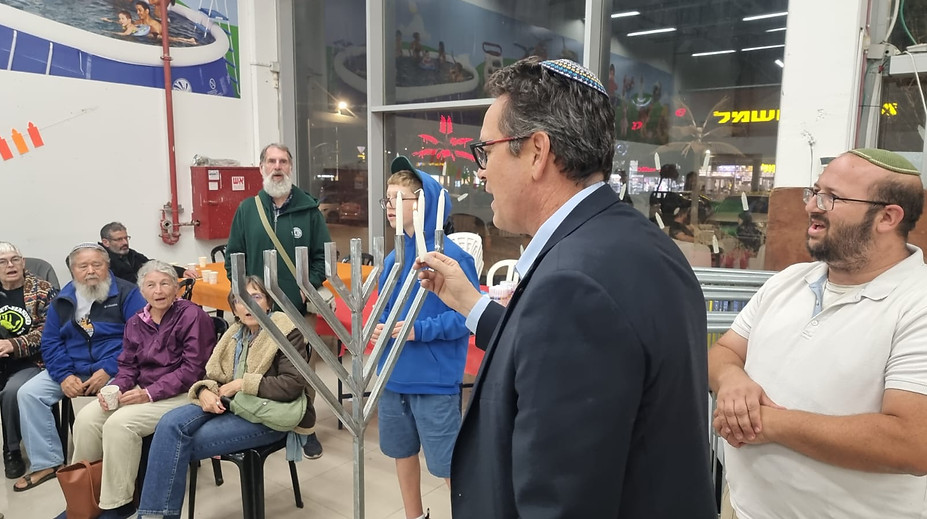
Programs Include:

The Nachshonim Youth Houses, a national educational model to support children from underprivileged populations and at-risk environments, promote equality and grow positive social leadership in Israeli society.

Pre Military Prep School for Humanist Leadership, an incubator for young boys and girls before their army service. The program helps foster a deep understanding of their mission to protect Israel’s borders, while instilling an appreciation for people from all backgrounds and religion.
Urban Socialist Educators, Haifa
Hashomer Hatzair Alumni Movement
The Alumni Movement of Hashomer Haztair began as a continuation of the ideals of the youth movement, working for a just, peace-loving Israeli society, rooted in the ideals of Zionism, socialism and the brotherhood of nations. Today, the Hashomer Hatzair Alumni Movement includes over 350 members between the ages of 21-40 across 35 cooperative lifestyle communities, who are engaged in education and social services, supporting thousands of children, soldiers and adults in Israel. Many of their national initiatives work to promote educational and leadership programs for underprivileged populations, pre-army preparatory schools and workshops to create dialogue for social equality and national identity.
These Educator’s Kibbutzim have become the cultural and ideological centers for many young Israelis in various regions of the country, while promoting a cooperative and egalitarian lifestyle. The Hashomer Hatzair communities play a significant role in fostering a sense of continuity and belonging among its members and the greater community. Through their collective efforts, the Hashomer Hatzair Alumni Movement continues to make a lasting impact on Israeli society, promoting social change and carrying forward the legacy of the Hashomer Hatzair movement.
Similar Communities in:
Givat Haviva, Rehovot, Netanya, Kfar Menachem, Holon, Ashkelon and Ramat Gan

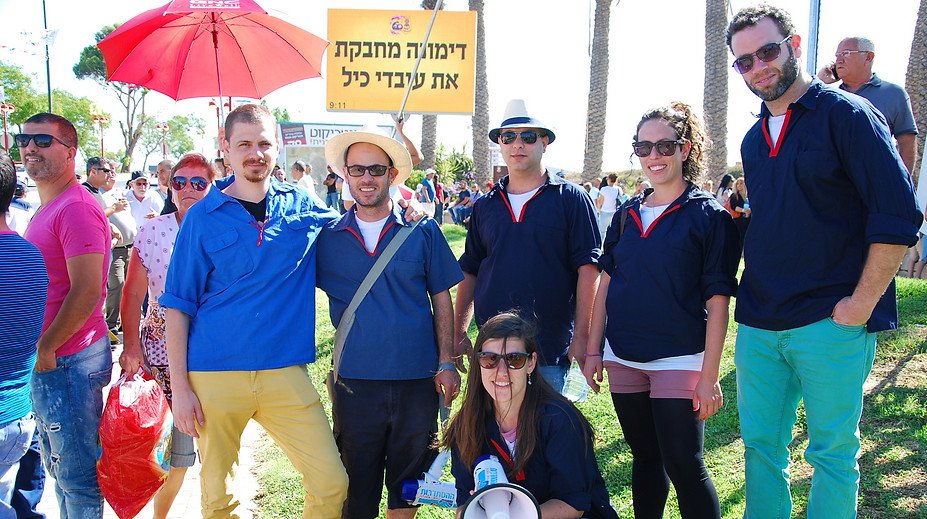
Programs Include:

Municipal Advocacy and Representation

Social Tourism

Employment Services and Networking Hubs

Professional Networking and Workshops

Community Programming and Infrastructure
Be'erot Pluralistic Community, Be’er Sheva
Eretz Ir
Established in 2010 by a small group of American immigrants together with local members of the Be’er Sheva community, Be’erot is working to build a pluralistic, egalitarian Jewish community in the Negev. Be’erot values social involvement and contributes in many ways to the Be’er Sheva community. The community centers around Jewish community life, balanced between tradition and innovation in their religious practices, learning, and social action projects throughout the region.
As part of the national organization, Eretz-Ir, Be’erot is an example of the establishment of urban communities, with involved residents who take personal and collective responsibility for creating solutions to local challenges. This results in strong community life, a safe and inviting urban sphere and diverse economic opportunities, focusing on three main areas – community, entrepreneurship, and employment – which propels educational, cultural and economic change. This promotes a sense of belonging and raises the quality of life for local residents, and helps make urban communities in Israel’s periphery as a preferred alternative to the overcrowded central region of the country.
Similar Communities in:
Harish, Ofakim, Be'er Sheva


Programs Include:

Beit Midrash for Leadership: Local seminary for social action based on the values of Judaism and Torah, with the goal of developing Jewish social leaders who will implement torah study into community development.

Community Center: The Beit Moriah Center for Families offers educational programs and activities for all ages, including classes and activities for the elderly, marriage counseling, family therapy, educational classes and social clubs.

Day Care: Meit Moriah offers three childcare centers throughout lower socioeconomic neighborhoods throughout Be’er Sheva, providing a strong educational foundation for local children before kindergarten.
Beit Moriah, Be'er Sheva
Keren Kehilot
The values of the Torah have been at the core of Jewish communities for generations, and Jewish identity continues to serve as a nucleus for millions of Jews throughout the diaspora. In Israel’s peripheral communities, Jewish life and community building often go hand in hand, and Keren Kehilot’s Beit Moriah Association of Be’er Sheva has helped provide social services to build a strong sense of belonging among the city’s residents.
Established with the aim of improving the quality of life for residents, Beit Morah focuses on creating a strong sense of community, fostering social cohesion, and addressing the unique needs of Be'er Sheva's diverse population. Located in the older “Daled” neighborhood of Be’er Sheva, Beit Moriah serves as a community hub that promotes Jewish-Zionist education, and through the values of the Torah, supports acts of kindness and welfare throughout the community.
The organization works closely with local government agencies, businesses, and community members to implement various projects and initiatives that enhance the well-being of local residents, from early childhood to senior citizens. The center offers afterschool programs for children, activities for seniors, volunteering throughout the city, events around Jewish holidays and various clubs and classes that strengthen the cohesion of Be’er Sheva’s Jewish community.
Similar Communities in:
Modi'in, Lod, Ashkelon, Dimona, Eilat, Nof Hagalil, Nehariya, Kiryat Shmona


Programs Include:

Tutoring and Academic Enrichment: Providing afterschool support that emphasizes learning and preparing homework in the students' homes individually or in small groups. The goal is to create a sustainable and productive learning environment while engaging parents in their children’s education.

English Online: This program pairs students of Ethiopian descent with volunteer teachers from North America to converse in English, made possible during the lockdowns during COVID-19. The objective of the program is to develop and exercise spoken English within the comforts of the student’s home, enabling students to work on their digital productivity, while maintaining their efforts to create a suitable working or learning environment at home.

Training Center: The Friends by Nature Training Center aims to improve personal identity and the role that the young leaders play in the community. Through their cultural experiences and shared dialogue, the training center helps to create and environment that instills meaningful significance through social endeavours
Ethiopian Community, Karmiel
Haverim Bateva
As one of the more marginalized immigrant populations in Israel, the Ethiopian community has struggled to ingrain themselves in Israeli society while maintaining their rich heritage and traditions. Haverim BaTeva was founded in 2005 by a group of young Israelis working to address issues of multiculturalism and personal identity. Embedding themselves in the most disadvantaged Ethiopian communities throughout Israel, these young men and women have become role models for the next generation, living together and turning their vision of empowerment and social responsibility into action.
Haverim Bateva’s focus on strengthening community, at-risk youth and informal education has helped change the perception of marginalized Ethiopian communities and given community families and children the tools for self empowerment. The organization actively works towards creating a supportive and inclusive environment where individuals can thrive and maintain their cultural identity.
Haverim Bateva implements a range of programs and initiatives tailored to the Ethiopian community's requirements. These include educational support programs, language classes, and vocational training, aimed at equipping individuals with the necessary skills for successful integration and professional development. The organization also organizes cultural events, celebrations, and gatherings to foster a sense of belonging and pride in Ethiopian heritage. Haverim Bateva further advocates for social equality and fights against discrimination, ensuring that the Ethiopian community's voice is heard and their rights are protected. Through its tireless efforts, Haverim Bateva is instrumental in promoting social inclusion and empowering Ethiopian residents to thrive in their new home.

Similar Communities in:
Yavneh, Beit Shemesh, Rishon Lezion, Lod, Petach Tikvah, Yokneam and Hadera
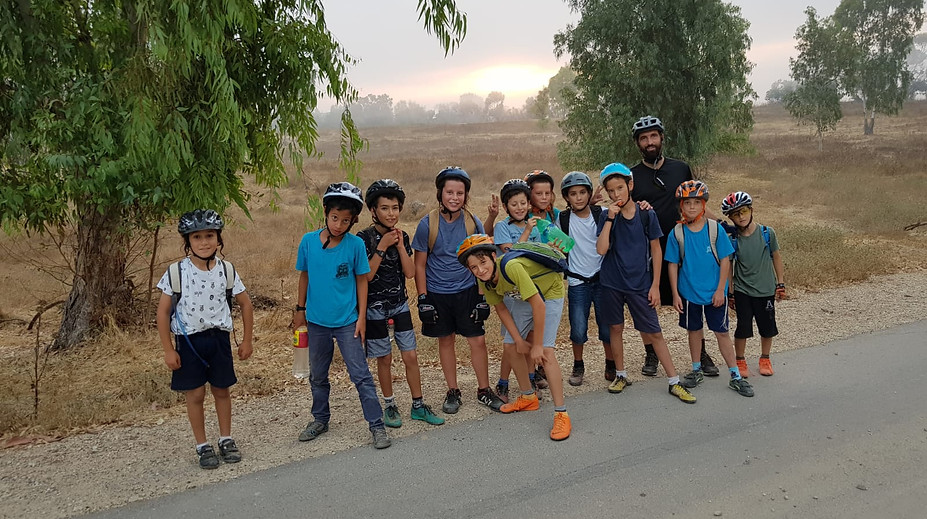
Programs Include:

Educational programming for visitors from Israel and abroad, who come and learn about Ethiopian agriculture and the history of Ethiopian Jewry from first hand accounts.

Agricultural training for younger members of the local Ethiopian community.

Social programs and employment for senior citizens from within the Ethiopian population
Ethiopian Community Farm, Kiryat Gat
Hinneni
For many isolated Jewish communities who have immigrated to Israel, cultural assimilation can be very one sided, and life in Israel can often be a stark contrast from their own unique identity. For the olderEthiopian immigrants, many of whom have seen their children and grandchildren born in the Jewish State, the departure from their proud agricultural background can mean a loss of identity, both for themselves and for the future generations. For the past 11 years, the Hineni Ethiopian Farm has provided this population with a return back to their roots, while sharing traditional Ethiopian agricultural practices with the younger generation of Ethiopians, as well as Israelis and visitors from around the world.
Hineni was founded by a small group of young Ethiopians, most of whom were born in Israel, and has now become a movement that has reinvigorated the older Ethiopian immigrants who endured an incredible exodus from their native country to find their home in the State of Israel. Elder members of the Ethiopian community are given the opportunity for employment and earn greater respect from within the community, while teaching others the traditional agricultural practices of their heritage. It has become a social hub, not just for the seniors, but as a bridge between generations as well as young Israelis from around the country and students from all over the world who come to Hineni to learn about Ethiopian culture, the story of the Jewish exodus from Ethiopia and the diversity of global Jewish culture.

Programs Include:

The Pardes Center for Educational Values, created as a social business, where teachers, youth movement directors and all types of educators throughout Israel are trained to work with youth on current issues in society, resolve conflicts and encourage youth to develop as responsible and caring adults.

New expansion of the Kibbutz, through the support of JNF-USA’s Housing Fund, providing new families with the opportunity to join this young Kibbutz.
Cooperative Socialism, Kibbutz Pelech
Ma'agal Hakvutzot
The Kibbutz movement was an iconic part of 20th century Zionism, founded on the principles of socialism, self-sufficiency and mutual cooperation. As part of Israel’s economic development the ideology of the socialized kibbutz movement has changed, diversifying its economic ventures and expanding into industries such as manufacturing, high-tech, and tourism. While many kibbutzim have opted to become privatized, Kibbutz Pelech remains true to the ideals of socialism and cooperation, believing that a meaningful community lifestyle is a tool for the liberation of people and society.
Located in the picturesque Galilee Region, overlooking the Mediterranean Sea, Kibbutz Pelech focuses on educational programming with an emphasis on shared responsibility, social justice and solidarity for the betterment of Israeli society. As part of the national network of “Ma’agal Hakvutzot,” Kibbutz Pelech works to promote social change in the spirit of socialism and egalitarianism, serving as a basis for cooperative partnerships throughout the country to share in mutual learning and create dialogue between different socio-cultural groups.
Similar Communities in:
Haifa, Pardes Hana, Tel Aviv, Beit Shemesh, Jerusalem and Sderot


Programs Include:
Community Leadership Development: Training local leaders to initiate and manage social projects that address the specific needs of their towns and neighborhoods.
Educational Enrichment and Youth Engagement: Running informal education programs that strengthen belonging, values, and civic responsibility among local youth.
Local Communities Network, Bnei Makom
Ofakim
Founded in 2015, Bnei MAKOM is a growing network of mission-driven local communities across Israel, empowering residents to take responsibility for shaping the social and cultural life of their own towns and neighborhoods. Rooted in the belief that lasting change begins from within, Bnei MAKOM unites young adults, families, and community leaders from all sectors of Israeli society — Jewish and Arab, secular and religious — who share a deep connection to their local environment and a desire to build a shared future.
Each community operates as a hub of local activism, promoting belonging, mutual responsibility, and civic engagement. Through local projects in education, culture, welfare, and art, members strengthen neighborhood identity and leadership, enhance quality of life, and encourage positive migration and long-term community resilience.
Today, 14 communities across the country are part of the growing Bnei Makom network, from Ramat Negev in the Negev up to Karmiel in the Galilee, together reaching over 10,000 residents annually and serving as a model for grassroots social change throughout Israel.
Similar Communities in:
Ashkelon, Tel Aviv, Netanya, Bat Yam, Lod, Karmiel, Jerusalem, Ramat Hanegev, Dimona, Ramla and Beit Shemesh


Social Impact Projects: Partnering with residents and municipalities to improve infrastructure, welfare services, and quality of life for vulnerable populations.



Programs Include:
Young Social Entrepreneurs, Kiryat Shmona
Tozeret Ha'aretz
Israel’s socioeconomic trajectory is making the dream of building a life in the Jewish homeland more challenging for the next generation. The rising cost of living and congestion in the central region poses a question to Israel’s young adult population- where to build their lives. Tel-Hai Academic College in the Upper Galilee, boasts 4,500 students, with 70% of its students coming from other regions of Israel. In the nearby city of Kiryat Shmona, Israel’s northernmost city, the student population of Tel Hai is nearly 20% of the city’s population, and the young social entrepreneurs of Tozeret Ha’aretz are working to integrate the energy of Tel Hai’s student life into the city.
For decades, Kiryat Shmona’s population has been stagnant, with limited employment opportunities and social infrastructure, but through the vision of Tozeret Ha’aretz, the Upper Galilee has become a solution to the economic challenges faced by hundreds of thousands of young Israelis across the country.
Collaborating with Tel Hai and the Municipality of Kiryat Shmona, these social entrepreneurs focus on four main areas that will help encourage more young Israelis to build their lives in the North: employment, education, housing and culture.
Community is a key factor in determining where to build a life for 80% of young Israelis. By establishing a living-working community together with local students and community residents, more and more young people are being empowered to build the kind of community they want to live in, and are rethinking their preconceived notions of the periphery. The national network provides stipends for young entrepreneurs to take part in being the change they want to see, offering unique opportunities to become community leaders and pioneers in their own right. Over 200 Tel Hai graduates have joined the Kiryat Shmona community, opening three more communities, and holding exciting events like the city’s annual beer festival, holiday celebrations, entertainment and more.
Similar Communities in:
Tzfat, Nof Hagalil, Tiberias, Hazor Hagalilit, Lod, Pardes Katz, Dimona, Jerualem, Sderot, Nahal Oz, Kiryat Malachi


Student scholarships: Students have the opportunity to be part of a co-living and creative community partnership initiative within the city. Applicants accepted receive subsidized rent and scholarships for academic studies.
Local Youth Networks: Community members work within the community to help support local youth and provide support in helping them grow. These networks help local youth take responsibility for improving their communities, giving them the tools to become social entrepreneurs themselves.
Social Entrepreneurship: The national network of Tozeret Ha’aretz provides grants for social and community initiatives led by movement leaders that help improve life for local residents.












